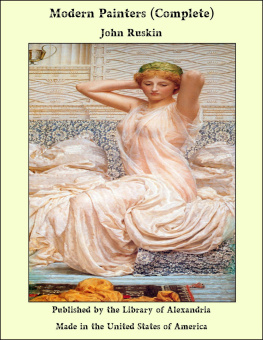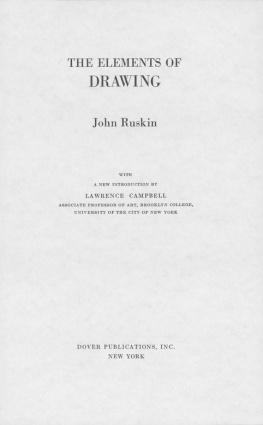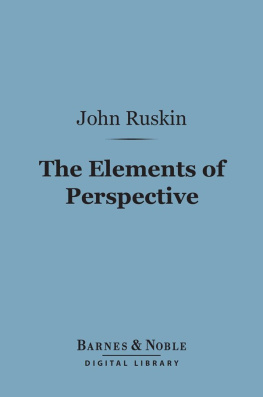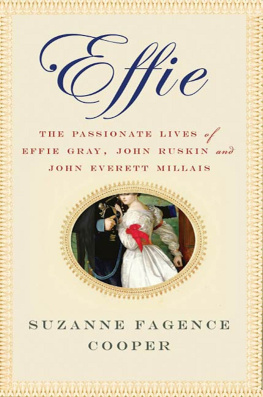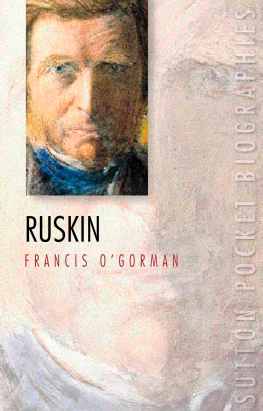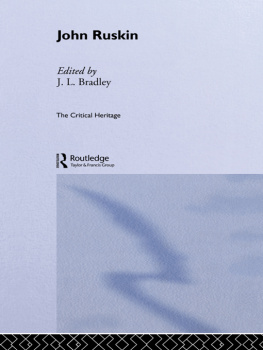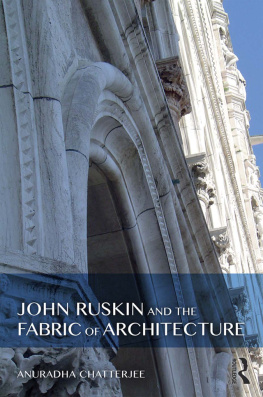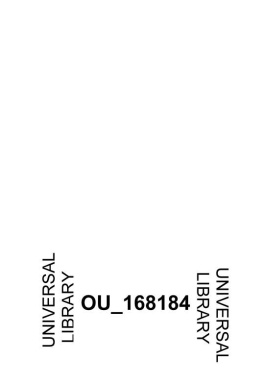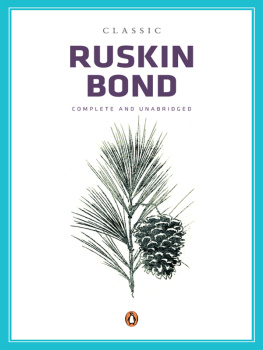John Ruskin - Modern Painters (Complete)
Here you can read online John Ruskin - Modern Painters (Complete) full text of the book (entire story) in english for free. Download pdf and epub, get meaning, cover and reviews about this ebook. year: 2020, publisher: Library of Alexandria, genre: Science. Description of the work, (preface) as well as reviews are available. Best literature library LitArk.com created for fans of good reading and offers a wide selection of genres:
Romance novel
Science fiction
Adventure
Detective
Science
History
Home and family
Prose
Art
Politics
Computer
Non-fiction
Religion
Business
Children
Humor
Choose a favorite category and find really read worthwhile books. Enjoy immersion in the world of imagination, feel the emotions of the characters or learn something new for yourself, make an fascinating discovery.
- Book:Modern Painters (Complete)
- Author:
- Publisher:Library of Alexandria
- Genre:
- Year:2020
- Rating:5 / 5
- Favourites:Add to favourites
- Your mark:
- 100
- 1
- 2
- 3
- 4
- 5
Modern Painters (Complete): summary, description and annotation
We offer to read an annotation, description, summary or preface (depends on what the author of the book "Modern Painters (Complete)" wrote himself). If you haven't found the necessary information about the book — write in the comments, we will try to find it.
Modern Painters (Complete) — read online for free the complete book (whole text) full work
Below is the text of the book, divided by pages. System saving the place of the last page read, allows you to conveniently read the book "Modern Painters (Complete)" online for free, without having to search again every time where you left off. Put a bookmark, and you can go to the page where you finished reading at any time.
Font size:
Interval:
Bookmark:
THE COMPLETE WORKS |
OF |
JOHN RUSKIN |
POETRY OF ARCHITECTURE |
SEVEN LAMPS |
MODERN PAINTERS |
Volume I |
THE AUTHOR
The work now laid before the public originated in indignation at the shallow and false criticism of the periodicals of the day on the works of the great living artist to whom it principally refers. It was intended to be a short pamphlet, reprobating the matter and style of those critiques, and pointing out their perilous tendency, as guides of public feeling. But, as point after point presented itself for demonstration, I found myself compelled to amplify what was at first a letter to the Editor of a Review, into something very like a treatise on art, to which I was obliged to give the more consistency and completeness, because it advocated opinions which, to the ordinary connoisseur, will sound heretical. I now scarcely know whether I should announce it is an Essay on Landscape Painting, and apologize for its frequent reference to the works of a particular master; or, announcing it as a critique on particular works, apologize for its lengthy discussion of general principles. But of whatever character the work may be considered, the motives which led me to undertake it must not be mistaken. No zeal for the reputation of any individual, no personal feeling of any kind, has the slightest weight or influence with me. The reputation of the great artist to whose works I have chiefly referred, is established on too legitimate grounds among all whose admiration is honorable, to be in any way affected by the ignorant sarcasms of pretension and affectation. But when public taste seems plunging deeper and deeper into degradation day by day, and when the press universally exerts such power as it possesses to direct the feeling of the nation more completely to all that is theatrical, affected, and false in art; while it vents its ribald buffooneries on the most exalted truth, and the highest ideal of landscape, that this or any other age has ever witnessed, it becomes the imperative duty of all who have any perception or knowledge of what is really great in art, and any desire for its advancement in England, to come fearlessly forward, regardless of such individual interests as are likely to be injured by the knowledge of what is good and right, to declare and demonstrate, wherever they exist, the essence and the authority of the Beautiful and the True.
Whatever may seem invidious or partial in the execution of my task is dependent not so much on the tenor of the work, as on its incompleteness. I have not entered into systematic criticism of all the painters of the present day; but I have illustrated each particular excellence and truth of art by the works in which it exists in the highest degree, resting satisfied that if it be once rightly felt and enjoyed in these, it will be discovered and appreciated wherever it exists in others. And although I have never suppressed any conviction of the superiority of one artist over another, which I believed to be grounded on truth, and necessary to the understanding of truth, I have been cautious never to undermine positive rank, while I disputed relative rank. My uniform desire and aim have been, not that the present favorite should be admired less, but that the neglected master should be admired more. And I know that an increased perception and sense of truth and beauty, though it may interfere with our estimate of the comparative rank of painters, will invariably tend to increase our admiration of all who are really great; and he who now places Stanfield and Callcott above Turner, will admire Stanfield and Callcott more than he does now, when he has learned to place Turner far above them both.
In three instances only have I spoken in direct depreciation of the works of living artists, and these are all cases in which the reputation is so firm and extended, as to suffer little injury from the opinion of an individual, and where the blame has been warranted and deserved by the desecration of the highest powers.
Of the old masters I have spoken with far greater freedom; but let it be remembered that only a portion of the work is now presented to the public, and it must not be supposed, because in that particular portion, and with reference to particular excellencies, I have spoken in constant depreciation, that I have no feeling of other excellencies of which cognizance can only be taken in future parts of the work. Let me not be understood to mean more than I have said, nor be made responsible for conclusions when I have only stated facts. I have said that the old masters did not give the truth of Nature; if the reader chooses, thence, to infer that they were not masters at all, it is his conclusion, not mine.
Whatever I have asserted throughout the work, I have endeavored to ground altogether on demonstrations which must stand or fall by their own strength, and which ought to involve no more reference to authority or character than a demonstration in Euclid. Yet it is proper for the public to know, that the writer is no mere theorist, but has been devoted from his youth to the laborious study of practical art.
Whatever has been generally affirmed of the old schools of landscape-painting is founded on familiar acquaintance with every important work of art, from Antwerp to Naples. But it would be useless, where close and immediate comparison with works in our own Academy is desirable, to refer to the details of pictures at Rome or Munich; and it would be impossible to speak at once with just feeling, as regarded the possessor, and just freedom, as regarded the public, of pictures in private galleries. Whatever particular references have been made for illustration, have been therefore confined, as far as was in my power, to works in the National and Dulwich Galleries.
Finally, I have to apologize for the imperfection of a work which I could have wished not to have executed, but with years of reflection and revisal. It is owing to my sense of the necessity of such revisal, that only a portion of the work is now presented to the public; but that portion is both complete in itself, and is more peculiarly directed against the crying evil which called for instant remedy. Whether I ever completely fulfil my intention, will partly depend upon the spirit in which the present volume is received. If it be attributed to an invidious spirit, or a desire for the advancement of individual interests, I could hope to effect little good by farther effort. If, on the contrary, its real feeling and intention be understood, I shall shrink from no labor in the execution of a task which may tend, however feebly, to the advancement of the cause of real art in England, and to the honor of those great living Masters whom we now neglect or malign, to pour our flattery into the ear of Death, and exalt, with vain acclamation, the names of those who neither demand our praise, nor regard our gratitude.
The Author.
It is allowed by the most able writers on naval and military tactics, that although the attack by successive divisions absolutely requires in the attacking party such an inherent superiority in quality of force, and such consciousness of that superiority, as may enable his front columns, or his leading ships, to support themselves for a considerable period against overwhelming numbers; it yet insures, if maintained with constancy, the most total ruin of the opposing force. Convinced of the truth, and therefore assured of the ultimate prevalence and victory of the principles which I have advocated, and equally confident that the strength of the cause must give weight to the strokes of even the weakest of its defenders, I permitted myself to yield to a somewhat hasty and hot-headed desire of being, at whatever risk, in the thick of the fire, and began the contest with a part, and that the weakest and least considerable part, of the forces at my disposal. And I now find the volume thus boldly laid before the public in a position much resembling that of the Royal Sovereign at Trafalgar, receiving, unsupported, the broadsides of half the enemy's fleet, while unforeseen circumstances have hitherto prevented, and must yet for a time prevent, my heavier ships of the line from taking any part in the action. I watched the first moments of the struggle with some anxiety for the solitary vessel,an anxiety which I have now ceased to feel,for the flag of truth waves brightly through the smoke of the battle, and my antagonists, wholly intent on the destruction of the leading ship, have lost their position, and exposed themselves in defenceless disorder to the attack of the following columns .
Next pageFont size:
Interval:
Bookmark:
Similar books «Modern Painters (Complete)»
Look at similar books to Modern Painters (Complete). We have selected literature similar in name and meaning in the hope of providing readers with more options to find new, interesting, not yet read works.
Discussion, reviews of the book Modern Painters (Complete) and just readers' own opinions. Leave your comments, write what you think about the work, its meaning or the main characters. Specify what exactly you liked and what you didn't like, and why you think so.

